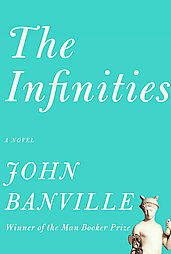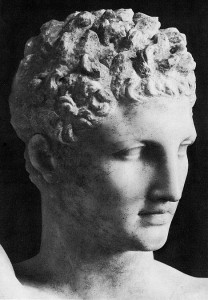Note: Irish novelist, John Banville is WINNER of many literary prizes, including the James Tait Black Memorial Prize, the Guardian Fiction Prize, and (2006) the Man Booker Prize for The Sea.
“I [Hermes] speak of my father [Zeus] as my father and of me as his son, but in truth these terms can be only figurative for us, who are not born and do not die, for birth and death are sources, it seems out of which mortal ones derive their sensations of love and loss….Think, if you can, of a sea of eternal potential and of us as the shapes the waters make, surging and swaying; think of the air moulded by weather into transparent forms; think of ice; think of flame–so are we, at once eternal and evanescent.”
John Banv ille, in his first “literary” novel since his Booker Prize-winning novel THE SEA, presents a most unusual novel which takes place in Arden, a large family home somewhere in Ireland or England, as the family gathers to pay homage to the dying patriarch, Adam Godley. Godley, who has had a stroke and is thought to be unconscious, is a mathematician renowned for having posited an “exquisite concept, time’s primal particle, the golden egg of Brahma from the broken yolk of which flowed all creation…the infinities.” As Godley himself acknowledges, “My equations spanned a multitude of universes yet they posited a single world of unity and ultimate order,” an appropriate achievement for someone whose very name reminds us of the creation of man, before the fall.
ille, in his first “literary” novel since his Booker Prize-winning novel THE SEA, presents a most unusual novel which takes place in Arden, a large family home somewhere in Ireland or England, as the family gathers to pay homage to the dying patriarch, Adam Godley. Godley, who has had a stroke and is thought to be unconscious, is a mathematician renowned for having posited an “exquisite concept, time’s primal particle, the golden egg of Brahma from the broken yolk of which flowed all creation…the infinities.” As Godley himself acknowledges, “My equations spanned a multitude of universes yet they posited a single world of unity and ultimate order,” an appropriate achievement for someone whose very name reminds us of the creation of man, before the fall.
Gathering round him are his much younger wife Ursula, who has a drinking problem; his son Adam and his beautiful actress wife Helen, who bears more than a little resemblance to Helen of Troy; and his strange daughter Petra in whom there is “something missing,” a young woman who is working on an “encyclopedia of morbidity.” Several servants are in attendance, and guests arrive at the house – Roddy Wagstaff, a man about whom Petra has romantic fantasies, and who may or may not be who she thinks he is; and ultimately, Benny Grace, who knew Adam when they were both young men, and who is often referred to as “goat-footed,” and resembling Pan. An assortment of Greek gods, invisible to all, are also in attendance – infinite beings who are able to disguise themselves as people and sneak in and out of their personalities – and even beds.

Hermes, the son of Zeus, is the primary narrator, commenting on what is happening in the house and among the characters, while, at the same time, keeping an eye on his father, the randy Zeus, who is found asleep and sucking his thumb following one amorous encounter. As Hermes explains, having himself been attracted to one of the women present, “You must understand, a god is not a gentleman and likes nothing better than to trifle with a lady’s affections, but,” he believes, “there are rules that apply even to a divinity, and it was incumbent on me to proceed with caution and deference, if the niceties of the game were to be preserved.”
Through the additional points of view of Benny Grace, and, surprisingly, Adam Godley himself, who, it turns out, is processing some of what is happening in his room, the lives of the characters take shape. Adam Godley’s past, his youth, his first marriage, his wife’s suicide, and his marriage to Ursula are revisited, while the others all deal with complications in their love lives, made more complicated by the tinkering of the gods. When various characters disappear from the house for assignations in various bowers, wooded and otherwise, the novel begins to resemble A Midsummer Night’s dream, and the huge thunderstorm which breaks before they can all return, brings the action to its climax.

Head of Hermes
The novel often resembles a farce, but it lacks the spontaneity that makes that genre so much fun. Instead, it feels as if every aspect of the novel has been composed and organized to the nth degree. At times it also feels like a novel of ideas, but those ideas are often murky, and there were times in which I wondered what Banville’s purpose was in writing the book. Clearly, he is commenting on life, and love, and death, all ideas which interest Hermes, since the gods share none of these experiences. At one point Hermes even comments that “birth and death are sources, it seems, out of which mortal ones derive their sensations of love and loss,” yet the novel does not seem to jell. The characters’ names suggest a modern allegory, but the disguises and the mischief of the gods complicate the characters’ lives, and the reader cannot always be sure which characters are real and which are the incarnations of various gods.
Banville may be at a crossroads here. He has recently written four mystery novels under the name of “Benjamin Black,” all very different from the novels he writes as “John Banville.” But this novel, while sometimes fun to read, seems stuck halfway between reality and infinity – not quite an “entertainment,” a la Graham Greene with his mystery novels, but not quite the serious novel of character and ideas that his Booker Prize-winning novel THE SEA represents. Not a comedy despite its absurdity, and a bit amorphous for serious literary fiction, this Banville novel is a puzzle in terms of its purpose but still fun to read.
Notes: The author’s photo is from http://latimesblogs.latimes.com and is by Kieran Doherty/Reuters.
The head of Hermes appears on https://pantherfile.uwm.edu
ALSO by Banville: THE UNTOUCHABLE, THE SEA, SHROUD, APRIL IN SPAIN
